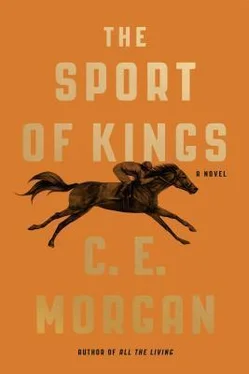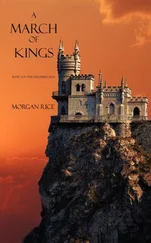John Henry sat quietly, his heavy hands on the wheel. “Tell me what you see,” he said.
Henry tore his eyes from the groomed land and looked at his father, weighing the truth against the trap he sensed there. “A horse farm,” he said cautiously, reluctantly, the words drawn out of him by sheer paternal force.
John Henry’s lips pinched into a hard smile. “Spoken like a child with a child’s understanding. Henry, I intend to have this conversation with you only once, and then the subject will be closed. Let me tell you what a grown man, a man of discernment, sees. What looks like a horse farm is really a cheap attempt at dignity. All these pretty things before you amount to a heap of goddamn rhinestones. Caveat emptor: significance is not for sale. Dignity can’t be purchased, Henry, least of all by these latecomers, these … these outsiders, who dress up their addictions in Sunday clothes and Derby hats. People call it a sport, but I’ll tell you this: this so-called sport is driven by compulsion, and weak men love nothing more than to abandon themselves to their compulsions.”
He turned to his son now, something raw in his eyes, though his voice remained low and controlled. “I saw that in the war,” he said. “And I believe you’ve seen it in our neighbor, Mr. Osbourne, who’s an embarrassment as far as I’m concerned. The man knows nothing about animal husbandry, nothing about the proper raising of horses, and his Wild West simpletons know even less. A gunshot wound, however impressively heroic it may appear to you, is merely the kind of excuse a weak man seizes upon to wriggle his way out of his real responsibilities. The very definition of a white goddamned nigger.”
He considered for a moment. “Henry, the education I’m purchasing for you is to keep you on the established path. Do you understand me? This…” He spread a hand forward toward the fields like an indignant blossom, his palm a ruddy ocelle, his fingers hard petals. “This is nothing but a rich man’s game, where he bets his better self and loses.”
“But we’re rich,” said Henry.
“There are two different kinds of rich, Henry. Our family name depends on your ability to distinguish between the two.”
Henry did not respond immediately, but stared ahead at the sweep of this farm, its perfectly painted buildings shining like white knights standing guard over an emerald expanse. His one ear was trained to his father, but the other extended itself in the direction of the fields and whatever sounds might be rising from them, which were none. Nature was manicured into silence. The horses moved slowly in that distant silence as if underwater.
Again, his father pointed out over the wheel. “Look how they’re trying to outshine every modest tradition that the first families established here two hundred years ago. This is just ostentation. Does your mother need to dress like a common prostitute to prove her value?”
Henry looked down, startled.
“And look at this one here.”
Henry turned to watch the slow progress of a black man stooped over his mower as he traced the outer edge of the fencing. His face was turned down against the midmost glare of the sun. He moved as if burdened by an unearthly fatigue.
“Watch how he slouches around without any dignity whatsoever. Born colored but made a nigger by being caught up in all this — and he knows it. He’s panning for fool’s gold, and it demoralizes him. The black race has always depended upon our guidance to steward them into lives worth leading. A colored man uses his place of employment as a school to learn the best of what white society can offer. It’s the only place he can hope to better himself, regardless of what the restless voices may shout from time to time. The irony of Negro intelligence is that it makes them aware of the poverty of their own intellect. The only proper response to white influence is humility. And the only right schooling is correction. To whatever degree is necessary.”
“But it doesn’t have to be as fancy as all this,” said Henry. “Mr. Osbourne just—”
“To condescend to any of this would be to insult your family.”
Henry’s eyes escaped his father’s and returned to the man at his mower. The boy’s heart rebelled, but there was a kind of plain disregard in the man’s body; he saw that, and it disappointed him.
“There’s a long line behind you, Henry.”
“I know,” he whispered, his mouth and eyes appearing downcast, but they were only distracted by his warring selves.
“Look at me, Henry, when I’m speaking to you.”
He looked at his father.
“You need to think like a man, not a child. There’s a sore temptation upon youth to discard with tradition, but tradition is learning collected. You’re a fool if you forget that and are forced to relearn what so many men before you have already learned. You owe obedience to them and you owe obedience to me, just as I owe it to them, and I owe it to my father, in greater degree than my brother because I am the eldest. All roads have led to you, Henry, and I won’t have you throw everything away for a heap of rhinestones. I’m a planter’s son, and you’re a planter’s son. There is no need for improvement, Henry, only adherence to a line that has never altered, because it’s never proven unsound. Have I made myself clear?”
“Yes, sir,” Henry said thinly.
His father narrowed his eyes. “Say it.”
“Say what?”
“Say right now whatever it is you want to say. This is the one and only time we’re going to have this conversation.”
“Well … I…,” Henry skated.
“Don’t flirt with your words.”
“What if,” Henry rushed, “what if your father had asked you to marry a different woman?”
John Henry reared his head back slightly, but he didn’t hesitate. He saw clear through his boy. “I would have married her,” he said, “just as he wanted me to.”
“But—”
“I would have married her,” he repeated firmly. “But I was smart enough to choose a woman of whom I knew he would approve. She came from good stock, she was beautiful and—”
“Never talked too much,” said Henry.
John Henry paused, his shrewd eyes gathering up the meaning in Henry’s face, but then he smiled slowly as if they were sharing the joke. His shoulders eased in his suit jacket. He brought his hands together now, so his fingertips touched. “I told your mother I’d be taking you to dinner this afternoon to a restaurant where I take my clients. They don’t normally admit children, but I spoke with them earlier and made an arrangement. Would that be to your liking?”
Henry nodded straight-faced and without speaking, his head bobbing in a mime of obligation. But then he pressed himself back into his seat and tasted the word “children” in his mouth as if it were something too vile to swallow. John Henry restarted the sedan, and Henry didn’t turn his head to the left or the right but watched the farm pass from the corner of his eye, so it washed by like a grassy stream through which horses ran.
* * *
In the house, Lavinia waited, unable to step away from the window until she saw the sedan pull up the long drive in the interminable stretch between sundown and darkness. Her nails were bitten to the quick. She assumed her old, reliable smile and stretched out her arms when her son walked through the kitchen door. But when she stepped to him, he pushed her arm away from him with startling force and charged up the back staircase, so she felt the vibrations on the steps like hammer blows. Whatever it was that he said in that moment with his back to her, she didn’t hear.
* * *
In the wintertime, John Henry took his bourbon in the front parlor. He returned home from Paris by five thirty and dinner emerged from Maryleen’s kitchen no later than six o’clock. Then, satisfied and regardless of desperate cold or wild easterly wind, he would stand for some time on the el porch, watch the snowy farm weather to gray as the stars spangled out of the black, feeling the night freezing and contracting around him. By the time Venus was setting in the south, he had returned to the parlor, where he could enjoy his solitude for another hour or so before bedtime. He unlaced and removed his black wing tips, placing them side by side on the Aubusson, and selected a seventy-eight for the player. Then he smoked a single Dominican cigar, which he removed from a carved bone box on the mantel, and sat on the davenport to read the Lexington Leader . He did this every winter evening without fail.
Читать дальше
Конец ознакомительного отрывка
Купить книгу












